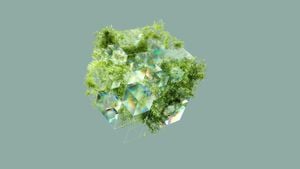Universities are increasingly recognizing the importance of interdisciplinary education to equip students for the challenges of the modern world. The University of Luxembourg stands out with its innovative approach, offering master’s degrees aimed at solving real-world problems through the integration of multiple disciplines.
One of the standout programs is the Master in Space Technologies and Business, which celebrates its fifth anniversary this year. Developed alongside the Luxembourg Space Agency, this unique degree prepares students to thrive within the booming global space industry.
Students are not just confined to textbooks; they engage heavily with industry partners through project-based learning. Graduate Lari Cujko shared, “The trainers were incredibly experienced and knowledgeable,” highlighting the practical exposure students gain from working with professionals at the Luxembourg Space Agency.
The Master’s degree programs at this university are intentionally multilingual and globally informed, recognizing the diverse backgrounds of its student body. Students will find themselves learning about new technologies and business models, empowering them to establish sustainable enterprises within the space sector.
Another intriguing offering is the Master in Entrepreneurship and Innovation. This program, accredited by the Foundation for International Business Administration Accreditation (FIBAA), is for ambitious individuals eager to create impactful businesses.
The curriculum combines theoretical foundations with practical experience, particularly through its partnership with the Chamber of Commerce. Students benefit from local incubator start-ups and gain insights on launching and managing new ventures.
For those interested in conflict resolution, the Master in Mediation addresses the critical skills needed to navigate disagreements and misunderstandings effectively. Its four-year program prepares graduates for managing social intervention projects and becoming qualified mediators.
Cross-national collaboration enriches the academic experience, especially evident in the Master in Border Studies. This program involves multilingual classes at four universities across three countries, allowing students to explore the multifaceted issues surrounding borders.
Experiential learning remains at the forefront, with mandatory internships giving students real-world experience before graduation. This hands-on approach combined with interdisciplinary study prepares graduates to speak to cultural, political, and economic issues at the borders.
The importance of communication is emphasized through the Master of Learning and Communication in Multilingual and Multicultural Contexts. This degree caters to the growing demand for professionals proficient in several languages and aware of cultural nuances.
Students will not only refine their scientific writing but also present their findings across three languages: English, French, and German. The program’s structure includes seminars, workshops, and networking opportunities for meaningful engagement with industry leaders.
With numerous student activities and social events, the University of Luxembourg creates a vibrant campus life. From collaborations with local businesses to cultural exchanges, students experience firsthand the importance of interdisciplinary education.
Interdisciplinary programs are reshaping higher education’s approach to producing well-rounded graduates prepared for the dynamic workforce. Universities everywhere could take cues from Luxembourg’s commitment to blending fields of study for comprehensive learning.
Feedback from graduates underscores the value of interdisciplinary education. Many report feeling better equipped to approach complex problems with insight from multiple perspectives.
Investing time and resources in these diverse educational programs also signals to industries the readiness of new graduates to tackle pressing global challenges effectively. The call for graduates who can think holistically echoes across sectors, and universities are responding.



